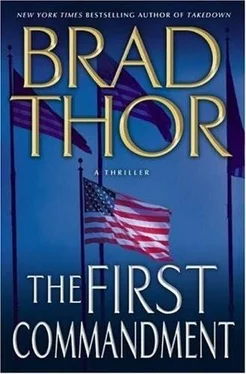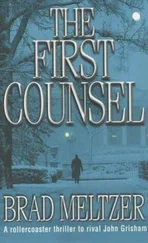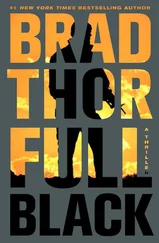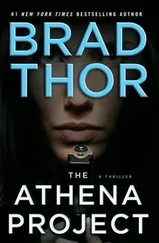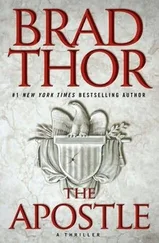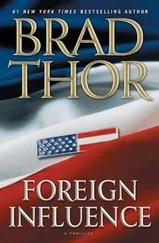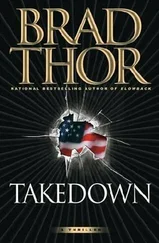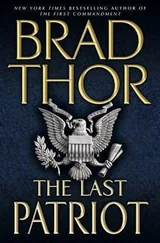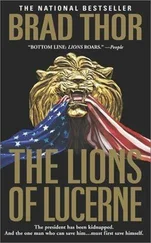When asked about it, the administrator claimed it had been a gift from the patient whom Harvath was looking for. It was all the identification Harvath needed.
Harvath’s taxi cab pulled up in front of an old, four-story building in Jerusalem ’s popular Ben Yehuda district. The storefront was composed of two large windows crammed full of antique furniture, paintings, and fixtures. The gilded sign above the entryway read Thames amp; Cherwell Antiques, followed by translations in Hebrew and Arabic.
A small brass bell above the door announced Harvath’s arrival.
The dimly lit store was still packed with tapestries, furniture, and no end of faded bric-a-brac. It had been preserved exactly as it was on his first visit here years before.
He neared a narrow mahogany door and pulled it toward him to reveal a small, wood-paneled elevator. Pressing a button inside, he watched as the door closed and he felt the elevator rise.
When it arrived on the uppermost floor, the door opened onto a long hallway, its floor covered by an intricately patterned Oriental runner. The walls were painted a deep forest green and were lined with framed prints of fox hunting, fly fishing, and crumbling abbeys.
As Harvath walked forward, he remembered the infrared sensors placed every few feet and guessed that there still were pressure sensitive plates beneath the runner. Ari Schoen was one man who took his security very seriously.
At the end of the hall, Harvath found himself in a large room, more dimly lit than the shop downstairs. It was paneled from floor to ceiling, like the elevator, with a rich, deeply colored wood. With its fireplace, billiards table, and overstuffed leather chairs, it felt more like a British gentleman’s club than the upper-floor office of a shop in West Jerusalem.
Sitting up in a mechanical hospital bed near a pair of heavy silk draperies drawn tight against the windows was the man himself.
“I knew one of you would eventually come,” said Schoen as Harvath stepped into the room. He was even more hideously deformed than before, his nonexistent lips barely able to shape the words emanating from his charred hole of a mouth. “I assume Philippe is dead.”
Harvath nodded.
“How did you know it was me?” asked Schoen.
“Adara’s bank account at Wegelin.”
“The payments to the clinic,” mused Schoen, as medical instruments clicked and buzzed around him. “I think you’re lying, Agent Harvath. That was a completely clean alias I was registered under. There was nothing to tie anything back to me. It had never been used before and hasn’t been used since.”
“It wasn’t the alias, it was your whiskey,” Harvath said, pointing at the antique globe that hid Schoen’s bar beneath its hinged lid. “The 1963 Black Bowmore. ‘Black as pitch,’ you once told me. You must have thought very highly of the hospital’s director to have given him such an expensive present.”
Schoen raised his hand to brush the thought away as if it was nothing. “You are more intelligent than I gave you credit for.”
“Tell me about the other men you had released from Guantanamo. What was their connection to you?”
“There was no connection,” said Schoen with a laugh. “That was the point. They were background noise that Philippe could be lost in. They were randomly selected to keep anyone in your government’s intelligence services who might come investigating, guessing.”
“And the plot with the children?”
“An unfortunate, but extremely effective motivator. When I discovered I had a grandson, I reached out to him, but our relationship was understandably strained. He wanted very little to do with me, but somewhere inside him he understood that we were the only family each other had.
“When he was captured and taken to Gitmo, I decided I would do anything to get him back.”
Slowly, all of the madness was beginning to make sense. “I want the names of your people who kidnapped and killed the school bus driver. I also want to know all of the other bus routes you had targeted.”
Schoen looked at him for a moment and then said, “The school bus we hijacked in South Carolina was the only one. There are no others. The photos of other buses were ploys to gain your government’s acquiescence, nothing more.”
His face was a mass of twitches and spasms, which made him nearly impossible to read. “How do I know you’re not lying?” asked Harvath.
“You don’t,” replied Schoen. “Only time will tell.”
“What about the names of the operatives who hijacked the bus?”
“I will take them to my grave,” said the man.
Harvath wasn’t surprised, but that would be for someone else to take up. He had other questions at this point. Glancing at the silver-framed photographs positioned on an adjacent console table, he asked, “So why me? Why my family and the people I care about?”
“Because Philippe wanted the man responsible for his mother’s death.”
“Which was his uncle, Hashim.”
“But his uncle was dead,” said Schoen. “The very idea of your being responsible for it all filled him with rage. Rage is a very powerful emotion. If a man has enough of it he loses his self-control. And when a man loses his self-control he is much more susceptible to the control of another.”
“So you pinned it on me,” responded Harvath.
“As I said. It was nothing personal.”
Harvath looked at him. “What was in all of this for you?”
Schoen sat up from his bed and spat, “Revenge!”
“Revenge against whom?” demanded Harvath. “Against me?”
“No,” hissed Schoen. “Against Philippe’s mother.”
“For what? The first time a Nidal blew you up, or the second?”
“It was for taking my son away from me,” he replied as he sank back into his bed.
“But Adara Nidal was dead,” said Harvath who was beginning to wonder if Roussard’s warped psychopathology was a condition inherited not from his mother, but rather from his paternal grandfather.
“It made no difference to me. Stealing her son from her and turning him to my cause would have been the ultimate act of revenge.”
“How could you expect an Arab, a Palestinian Arab at that, to renounce Islam and pick up the Israeli cause?”
“You forget that after my Daniel died I studied everything I could about Abu Nidal, his organization, and most important, his family. I knew more about them than they even knew about themselves. Philippe lacked a masculine role model.”
“And that was going to be you?” said Harvath facetiously.
“Half of my blood, my Daniel’s blood, ran through his body. He was half Israeli and I believed I could appeal to that side of him. But before he would listen to anything I had to say-”
“He wanted me dead,” stated Harvath, finishing Schoen’s sentence for him.
“Precisely. But he didn’t only want you dead. He wanted you to suffer. He wanted you to feel the pain he had felt at losing his mother. I knew I could use this incredible rage to draw him closer to me.”
“And the plagues and running them in reverse order?”
Schoen was wheezing, and stopped for a moment to catch his breath. Finally he said, “The plagues were a tribute to his mother, who devoted her career as a terrorist to igniting a true holy war against Israel. Her attacks were often tinged with Jewish symbolism.
“As for running the plagues in reverse, you must already comprehend what a disturbed individual Philippe was. In his mind, the first plague was the most shocking and dramatic, so he ran the plagues backward, conducting himself as God’s opposite, the devil, if you will, who was saving his favorite plague for last.”
“And you thought you could reprogram this monster?” said Harvath.
Читать дальше
